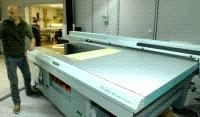LFP - Large-Format-Printing
BMA enters light industrial printing market with Fujifilm

Friday 01. August 2014 - Following a year's beta testing of Fuijfilm's thermo forming UV-cured inkjet ink, Uvijet KV, French sign and display printer BMA can now produce personalised light industrial applications with its Fujifilm Acuity Advance Select UV flatbed printer. This investment helps underpin the expansion of the company's European business, coinciding with the launch of the BMA Benelux branch in Brussels last June.
Based in Amiens, BMA produces a wide range of POP, sign and visual communication products for different industries, including food (Unilever, Nestlé, Coca-Cola, McDonalds) and cosmetics (L’Oréal). The company is able to offer a variety of services, from consultancy, pre-press, printing, finishing and delivery, thanks to both screen and digital technologies – including three Inca Spyder devices.
Nicolas Coquet, co-owner of BMA, explains: “We like our customers to view us as a source of inspiration for new ideas, and thermoforming helps us to further establish this reputation. It requires a great deal of expertise and technical knowledge in how to prepare files and use the right materials to accurately execute anamorphosis (i.e. reconstructing the original image file as a physical application).” He continues: “Thanks to our beta phase with Fujifilm’s Uvijet KV ink and Acuity Advance Select – including the dedicated software solution and training of our now skilled operators – we have a great understanding of how to use the technology effectively to further differentiate our service offering and enter new markets.”
Fujifilm’s thermo forming ink has been designed specifically for use with its renowned mid-range flatbed printers, the Acuity Advance Select and Acuity Advance Select HS. Unlike other UV inks, Uvijet KV does not crack or flake during the thermoforming process. It maintains the high quality, vivid colours and excellent performance expected from a Fujifilm ink, without any compromise to the print speed.
The thermoforming process sees a flat plastic sheet printed and then removed to a mould, where it is heated up to take on the shape of the mould, and then cooled. The ink has outstanding elongation properties of up to 1000% when heated, returning to a ‘normal’ state when cool.
Nicolas concludes: “We worked closely with Fujifilm to ensure that the ink was flexible enough to go up to the 180° we required without detriment to colour intensity, which it was, and we now have a new and exciting customer proposition to diversify our business.”
